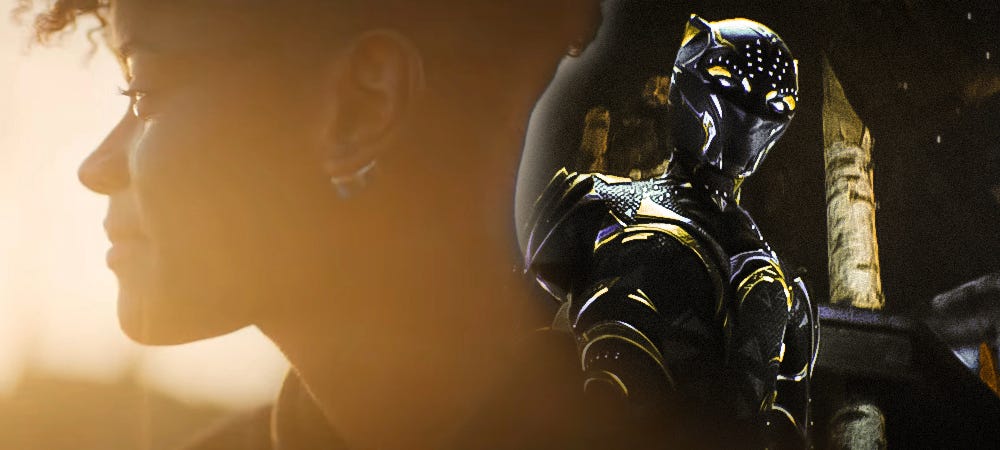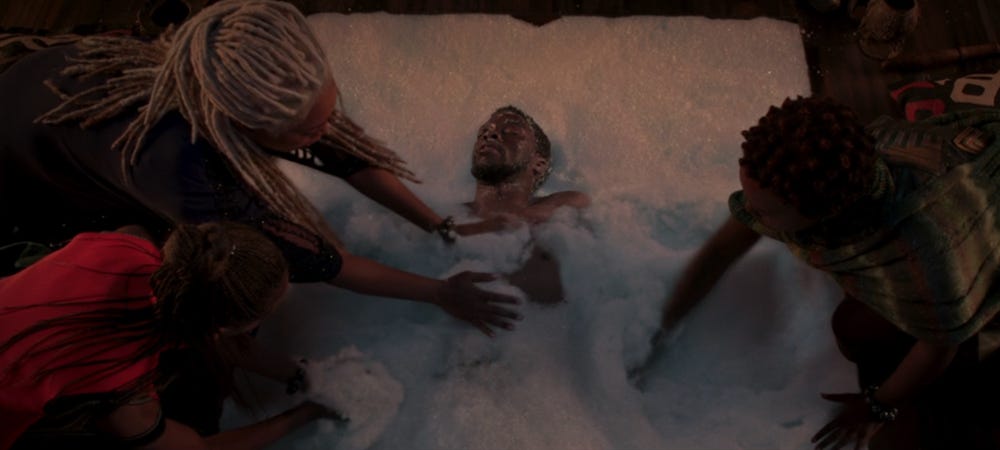scoffing at tradition: Shuri's great crisis in Wakanda Forever
You can't "show them who you are!" if you have no flippin' clue + a brief Fieldmoot debrief! Spoilers btw.
Warning: This post contains some spoilers for Black Panther: Wakanda Forever, but not the biggest one.
Early in the first Black Panther movie, before T’Challa is crowned king of Wakanda, he is stripped of the powers of the panther in a ritual ceremony where wanna-be-kings have the opportunity to claim the throne. When it becomes clear that no one wants to challenge the prince, Shuri, T’Challa’s sister and Wakanda’s resident tech wizard, calls out, “This corset is really uncomfortable, so could we all just wrap it up and go home?”
The crowd groans. Queen Ramonda pinches the princess. (It’s a pinch felt by every black person who squirmed too much as a child in a church pew.)
As the crowd settles, M’Baku, leader of the Jabari tribe, arrives to challenge T’Challa. His very first complaint, however, is about Shuri: “We have watched in disgust as your technological advancements have been overseen by a child…who scoffs at tradition.”
It’s a throwaway charge, one the 2018 outing doesn’t return to, but it becomes the central inner conflict for Shuri in Black Panther: Wakanda Forever.
In the dark seconds before the film dawns, we hear a whispered prayer. It’s Shuri, pleading and contrite. She begs Bast, the panther goddess, to heal her brother. Anyone who’s ever bargained with God will recognize her prayer: if my brother lives, I’ll never doubt you again.
And then the elevator opens onto the bright lights of Shuri’s lab. An AI is talking. Shuri snaps orders. Scientists rush about trying to piece together the DNA of the Heart-Shaped Herb, which gives the Black Panther his powers, in hopes of saving their king.
Long story short, Bast does not heal T’Challa, and Shuri gives in to her inklings of disbelief about her people’s mythic and ancestral underpinnings. She sees no gods in the world. Now, she has no reason to believe, and her scoffing at tradition is validated.
A year later, Shuri has buried herself in her lab work. Since Bast has proven unwilling (or unable) to protect her country, the next time Wakanda is challenged, Shuri’s technology will save them all.
Queen Ramonda, recognizing the cracks in her daughter’s exoskelton, pulls the princess away from her lab and out to a river bank where they talk about how she’s been handling her grief. Ramonda tries to get Shuri to participate in a ritual: burning their funeral clothes to put a lid of finality on T’Challa’s death. But Shuri refuses.
Ramonda professes that the ancestral rituals bring her comfort and strength. In her meditations, T’Challa has come to her, placed a hand on her shoulder and gently pushed her to look forward, not back.
Shuri protests that such rituals only bring her torture. If she stops to think too long, to meditate and sit with grief as her mother does, that grief will consume her. She says, already, that she wants to burn the world down.
Shuri spins frenetically on the edge of darkness. She has no anchor, nothing to cling to as her world is whipped about like a kite in a hurricane. No Bast. No ancestral legends. No rituals or myths to look to for guidance. Her emotional and moral axis runs from her pain at one end to her sci-tech innovations at the other. Her scoffing at tradition has turned into a full-blown life crisis.
I say none of this to condemn Shuri—on the contrary, she is a projection of generational discontent with dissatisfying structures (religious, political, and otherwise)—but only to point out how much metanarratives matter. It is not about truth per se. It doesn’t matter if Bast exists or if burning your funeral attire actually frees you from the grip of grief. But it does matter if people are divorced from a story, if they refuse to buy in to grand reçits.
In the new film, Shuri is on the cusp of launching a mission to kill Wakanda’s new nemesis Namor, the leader of the underwater kingdom of Talokan. It’s M’Baku who points out, privately to Shuri, the folly of this aim. We call our leaders ‘lord’ and ‘king,’ he says. The Talokani call their leader ‘god.’ If we kill him, we risk eternal war.
The Talokani, like the Wakandans, are a people rooted in ritual and story. A story of disease and death and escape from oppressors. A narrative of hope: in which their prince-god, Namor, labors to build an empire for them and brings the light of the sun into the depths of the sea. He is the telos of their hopes and dreams: everything they aspire to be is wrapped up in him.
The Talokani feel toward Namor as the disciples felt toward Christ: “Lord, to whom shall we go? You have the words of eternal life!” Of course, for the Talokani, they can go nowhere else; they cannot survive for long apart from the sea.
Shortly after Queen Elizabeth II died and all of Great Britain’s pomp and flummery rolled out in tribute, there was an article in The Sunday Times titled, “Scoff at ritual if you like, but nations cannot survive on rationality alone.” The author, Matthew Syed, wrote in rebuttal of those who said ritual and proceduralism ought to have been dispensed with and that the Queen’s coffin could have been transported to Westminster Hall “in two minutes flat in a fast truck.”
Well, it could have. But that’s not the point.
Syed, who usually writes about sports, likens the royal funeral proceedings to (British) football players slapping a sign on a wall before they go out on the field. Everyone acknowledges “that the gesture has no logical connection with the winning of football matches.” But…
the gesture connects them with previous generations who touched the same sign, the sense of being bound up with the great teams of the Seventies and Eighties, of their fleeting role in an unfolding story.
Perhaps I’m writing this because I’m more like Shuri than I’m comfortable with. I do tend to be quite the rationalist. If someone says, this is the way we’ve always done it, I’m the first to point out that doesn’t make it right. But I’m no iconoclast. I am looking for the big story at the back of things, the root that explains the tree’s branches, the icons and images that point to reality.
To dismiss ritual and tradition is, as Syed puts it, “a failure of imagination.”
Divorced from the rituals and stories of her ancestors, Shuri can only imagine the world on fire. A world that she sets on fire.
When Shuri finally succeeds in remaking the Heart-Shaped Herb (via 3-D printing no less), her late brother’s lover Nakia helps her grind it up and liquefy it so Shuri can drink it and (hopefully) become the Black Panther her nation needs. Nakia frets because they are in Shuri’s lab and not in the underground City of the Dead where all other Wakandan leaders underwent a ritual burial in order to access the Ancestral Plane after drinking the liquefied Heart-Shaped Herb. We at least have to cover you with something, she says.
Shuri hastily dismisses this suggestion. She closes her eyes, crosses her arms over her chest, and lays back on a metal table.
When she awakes, she doesn’t meet any ancestors. She meets Killmonger, her cousin, another tortured soul who was divorced from the traditions and rituals of his people before he even had a chance to understand them. He, in turn, tortured Wakanda, setting the City of the Dead on fire and destroying the crop of Heart-Shaped Herbs. (Hurt people hurt people, etc.)
It’s just the two of them there. Shuri and Killmonger. And their pain, anger, grief, and hatred. Two ships lost in a flaming ocean.
That is what becomes of a person—or a nation—divorced from a big story. Without tradition and ritual, without myths and legends and ancestral tales, we lose pieces of ourselves. We lose pieces of truth that can anchor us to the past and cast a stable vision for the future. And even if it’s not truth per se that we are after, the usefulness of rooted ritual in helping us grieve, love, learn, and long for is unmatched.
Such rituals, in Syed’s words, “signal not what we wish to do, but who we are.”
“Show them who you are!” is Queen Ramonda’s ringing cry.
But Shuri can’t. At least not yet.
asides + signal boosts
I finished re-watching Black Panther for the first time since 2018 the night before I went to see Black Panther: Wakanda Forever. Ryan Coogler & Co. had a very tall order with the sequel, and they delivered beautifully. (Very minor note: I love the brand of sauce that Julia Louis-Dreyfus is bringing. You know how we have terms like grimdark and edgelord. Can we have evilfun? Because that’s Director de Fontaine. Don’t worry, I have other, more serious thoughts that might come around later. Go see this film!)
Fieldmoot! is a thing that is now in the books as of last weekend. It’s an online conference about creativity and Christianity inspired by Hutchmoot Homebound and gradually pulled together over a year by a crack team of agents and amateurs. I delivered a presentation titled The Beauty of the Semi-present Narrator, and there are a lot of other excellent presentations all available for free at fieldmoot.com. I would like to thank our official sponsors: Discord, Zoom, and Google Docs.
Recommending another Image Journal article: Christ the Chimera: The Riddle of the Monster Jesus. It’s very long, but it’s very worth it if you are interested in art and symbols and how depictions of things change over time and across cultures. It says things like this:
The great appeal of Christ is that he is endlessly chimerical; he is the chimera that will never—can never—be reduced to a schema. Something about his character is almost infinitely adaptable to social needs, and attempts to codify him have always failed.






